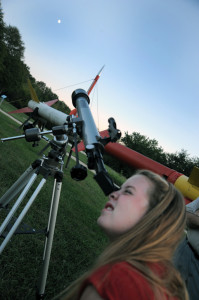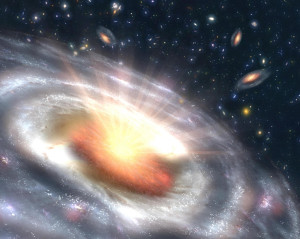Summer time is a great time to do outdoor activities. Swimming, camping, amusement parks, beaches. Star gazing, too! Perhaps we know how to find the big dipper, but how do we help our kids learn about the stars or what if they ask about black holes? I asked my friend, who pursued a career in astronomy, a few questions to map out some tips. Her name is Lara Eakins and she works at The University of Texas.
The Hobby Hound:
We took astronomy in high school together but how long have you had an affinity for it?
Lara:
Probably since I was about 4 or 5 years old, but I think it really took off after I saw the original “Cosmos” when I was 8 years old. (It’s so cool that I have to designate the “original” vs “new”!!)
The Hobby Hound:
What is your current job title?
Lara:
My “official” title in the UT job classification system is “Laboratory and Technical Services Supervisor”, but the one I usually use to explain what I do is “Astronomy Outreach and Instructional Technology”.
The Hobby Hound:
Where is the best place to start learning about astronomy in general? Book, website, video, app maybe?
Lara:
There are almost too many resources now! I’ll tell you about a few that I know of, but I’m sure these are just the tip of the iceberg.
I would recommend taking a look at the reviews that Emily Lakdawalla (of the Planetary Society) does on her blog. Here’s an archive list. She’s the mom of two young girls and keeps an eye out for good space resources for kids.
If you want to start learning your way around the sky, there are a quite a few apps out there that can help. I use Sky Safari, which might be a bit more advanced – it’s more helpful for looking for things once you’re already kind of familiar with the sky.
Sky Guide and Star Walk are a few examples of the apps that can tell you what you’re looking at if you hold it up to the sky, which might be better for getting to know your way around the sky. And most of those apps will give you more information on an object (star, planet, constellation, etc.) if you click them. That’s a good way to start getting the basics.
I would also recommend the magazine websites that I have linked below, since they have good general info, news, and beginners guides.
The Hobby Hound:
Do you have any suggestions if we want to look up something specific, like constellations or planets or space exploration?
Lara:
Some of it will depend on what exactly you’re looking for. The two topics that I probably get asked the most about are black holes and aliens, so here are a few resources for those:
StarDate Magazine has a sub-site called the Black Hole Encyclopedia.
And for aliens, I recommend checking out the SETI Institute (in particular the Educators and Students section).
The main pages of the magazines I listed below will have a lot of good news articles and info sections.
For space exploration, NASA and JPL are the best. Both of those sites will also have links to sites for specific missions, such as the Mars Curiosity Rover or the Cassini orbiter at Saturn.
The Hobby Hound:
How can we find events that will happen soon, like meteor showers or sighting of planets?
Lara:
I do a weekly recording of what’s up in the sky called The Skywatchers Report that you can find at 512-471-5007, or online here. I usually do a round-up of where the moon is, the rising and setting of the naked-eye planets, and any extra info about meteor showers, eclipses, etc. if something is happening that week. The second part of the recording is information on our public viewing nights on UT campus telescopes.
There are also good sky calendars at
Sky & Telescope Magazine
(they also have this available as an app called Sky Week)
If you want to know about when the International Space Station is passing over, I use this site. (this link is pre-set for Austin in the upper right corner, but you can set it to other locations)
The Hobby Hound:
Are there any other fun things to do or places to visit that involve astronomy? Space Center in Houston? Any camps/groups/clubs for kids that you know of?
Lara:
For those in Austin, Texas, we have three nights open to the public on our UT campus telescopes while UT is in session. All of the information about that is posted here.
There is also a local amateur astronomy group called the Austin Astronomical Society who has monthly meetings and events.
A few local organizations have science and nature summer camps. Some are astronomy/space specific and some have a “space week” as part of a longer program. Here are a few that I know of:
Austin Planetarium 2014 Summer Camp
The New Austin Children’s Museum’s Summer Camps
In Texas:
I haven’t visited NASA in Houston in a long time and I know they have changed things up quite a bit, but I’m sure it’s still a fun visit for anyone interested in space! And if you’re in Houston,a trip to the Museum of Natural History and the Planetarium is also fun. (That’s down in Hermann Park, where the zoo is as well.)
We have a great visitors program at McDonald Observatory out in west Texas.
The Hobby Hound:
I know astronomy is neat. Why is it important? What can we learn by observing constellations, planets, meteor showers, etc? What are some things we have learned by studying astronomy?
Lara:
I could probably write a whole book to answer this question, but I’ll just offer a few examples! Since you mentioned meteor showers, even amateur astronomers can help with the science by observing the numbers of meteors they count in a certain time and where they come from because it helps to map the debris cloud that we pass through that causes the shower. In most cases, it tells us about the parent body that left the debris, usually a comet. And studying things like the orbits and composition of comets and asteroids can help us learn about the origin of the solar system.
Learning about the other planets can sometimes tell us more about our own planet. A prime example is the atmosphere of Venus, which has a run-away greenhouse effect causing its surface temperature to reach ~800°F. Learning more about Venus’ atmosphere can help us understand global warming here on Earth.
And one thing that I used to work on when I was doing research – I was part of a team that measured the positions of asteroids and comets (in particular, newly discovered ones) to figure out their orbits and make sure they won’t hit Earth. While we never found one that would hit the earth, we did do some of the early measurements confirming that Comet Shoemaker-Levy-9 would hit Jupiter (which it did in July 1994).
The Hobby Hound:
How can we take learning about astronomy to the next level? What are some more in-depth books or websites about astronomy or do you know some camps/clubs for the kid who shows an affinity for it as you did?
Lara:
The higher-level camps for astronomy and space are all out of state, but for a kid that is getting interest to the point that they might want to chose astronomy as a career, I would recommend Astronomy Camp in Arizona. I’ve known a few people went into astronomy as a career that attended that camp as teens.
And there is also Space Camp, which is more geared towards those interested in astronautics, aeronautics, and engineering (that’s what I attended in 1988).
For book or website recommendations, it would again depend on the specific topics you are looking for or what level you’re looking for. One idea for an older kid (especially if they don’t have a chance to take astronomy in high school) would be to go to a used bookstore and see if you can find a used copy of an introductory astronomy textbook. You’ll find a variety of levels of math in them, but they will have a good overview of many areas of astronomy.
…
Many thanks, Lara, for all this great information!
I hope to visit with Lara in June and talk about telescopes. If you have questions you’d like to ask me or Lara, please drop a comment or email me!







Get Social!